14+ Best WordPress Blogs That I Follow in 2026
There’s no shortage of content on WordPress. But finding truly helpful WordPress blogs? That’s a different game.
Over the years, I’ve followed hundreds of websites, read thousands of articles, and saved way too many bookmarks. Some blogs disappeared. Some got bloated with AI fluff. But a few—just a few—stood out. They weren’t just pushing plugins or hyping the latest trend. They were teaching, guiding, and challenging readers to build better WordPress websites.
Whether you’re a developer, blogger, designer, or just getting started with WordPress, the right blog can become your silent mentor.
In this post, I’ll share the WordPress blogs I personally follow and recommend.
These are the ones I keep coming back to—because they offer real value.
Let’s dive in.
Table of Contents
Why Follow WordPress Blogs?

Let’s face it—WordPress moves fast. Themes evolve. Plugins break. SEO rules change overnight.
If you’re not actively learning, you’re falling behind. That’s where WordPress blogs come in.
They keep you updated without the fluff. The best ones break down complex topics into simple, actionable advice. You get insider tips, security warnings, performance hacks, and even honest plugin reviews—all without digging through the endless noise of forums or random Reddit threads.
Here’s what I personally get from them:
- Stay ahead of trends before they hit your client’s inbox
- Discover performance tips that actually work
- Explore plugins and tools you might’ve never heard of
- Learn from industry leaders who build the ecosystem
- And yes, catch core WordPress updates before your site crashes
These blogs aren’t just helpful. They’re essential if WordPress is a serious part of your workflow.
The Best WordPress Blogs You Should Bookmark
Here are the blogs I regularly read, respect, and learn from. Each one brings something unique to the table. Since I cannot rank these due to my ethical commitments and personal choice, I have sorted the blogs in alphabetical order.
Adam’s Perspective
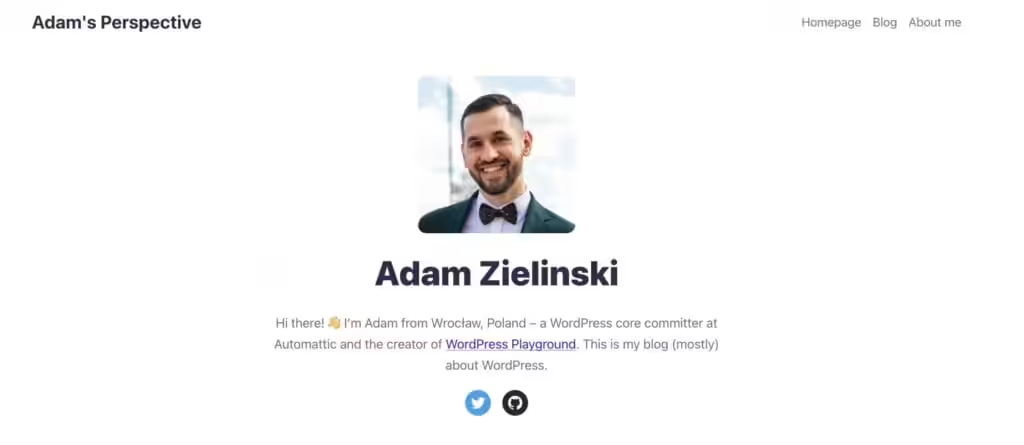
Adam Zieliński is a WordPress core committer at Automattic and the brilliant mind behind WordPress Playground (yes, that in-browser WordPress environment). Based in Wrocław, Poland, Adam brings a rare mix of technical depth, philosophical thinking, and clean, open-source-first values to everything he shares.
His blog isn’t your usual roundup of tutorials and “10 ways to boost your site” fluff. Instead, it’s packed with insights—deep dives into topics like SQLite, Unicode quirks, PHP edge cases, and experimental WordPress features that haven’t even hit mainstream dev blogs yet. You’re literally getting a peek behind the curtain of how modern WordPress is being built—by someone who’s committing the code.
Some of his recent posts show just how wide his lens goes. It’s niche, technical, and wildly useful if you care about building performant, modern, and future-proof WordPress experiences.
If you’re a serious block-based theme dev, plugin builder, or just a curious engineer, you need to be following Adam. His blog isn’t just a tech feed—it’s a glimpse into the future of WordPress development.
Astra Blog
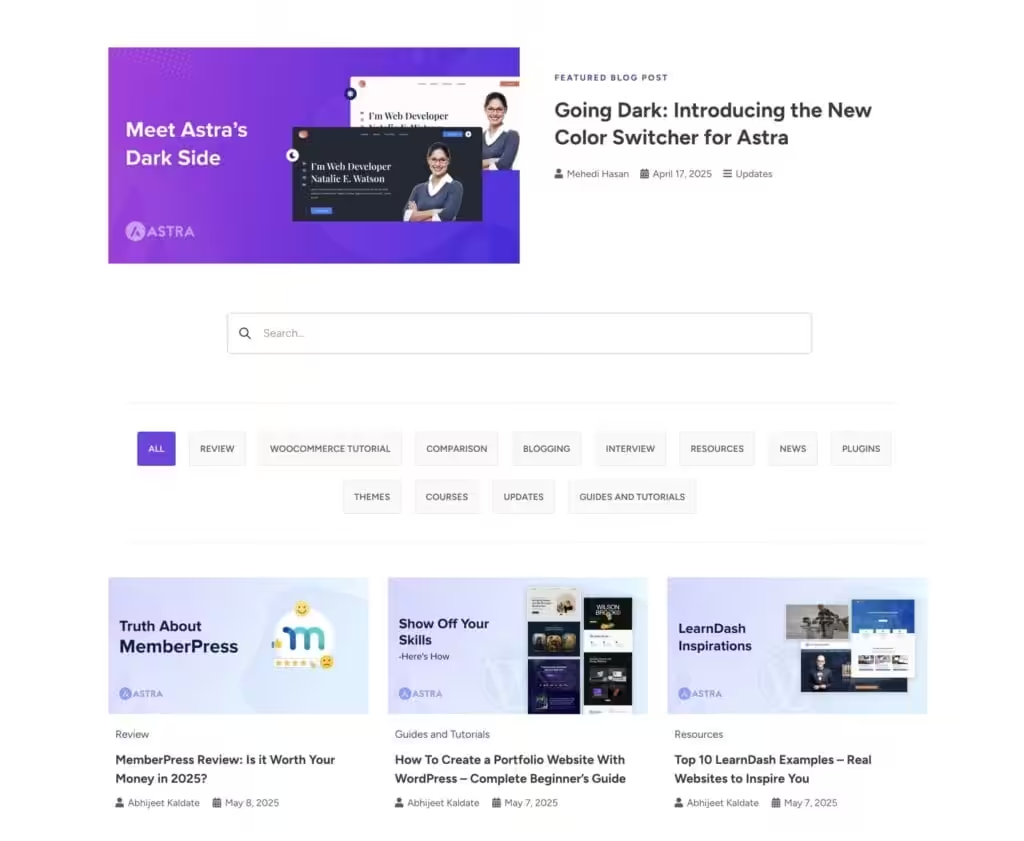
The Astra Blog comes from the same folks who built the Astra Theme and Spectra—two tools I genuinely recommend to clients looking for clean, high-performance WordPress setups. But their blog isn’t just product updates or glorified changelogs. It’s packed with actionable insights that are perfect for freelancers, solopreneurs, and agency folks trying to stay ahead without drowning in jargon.
They cover WordPress speed, design systems, UI/UX, and WooCommerce setup in a way that’s both accessible and focused on real-world implementation. And yes, they lean into page builders—Elementor, Spectra, and even block-based themes—but they do it with nuance.
It’s not the nerdiest blog out there (you won’t find deep dives into PHP or REST API here), but that’s exactly why it works. When I need a quick refresher on performance best practices or a resource to share with clients, the Astra Blog is usually where I land. It’s clean. It’s helpful. And it respects your time.
Chris Lema

Reading Chris Lema’s blog feels less like reading and more like sitting across from a mentor. He doesn’t dish out generic how-tos. Instead, he dives deep into pricing psychology, SaaS thinking, plugin ecosystems, and the subtle art of positioning—especially for solopreneurs and product creators.
When I was struggling to confidently price a WordPress service, Chris’s old posts helped more than any ebook or webinar ever did. He just gets it.
You won’t always agree with his takes—and that’s the point. He forces you to think. That’s rare. It’s like a business class wrapped in a blog post, and I keep going back for more.
CSS-Tricks
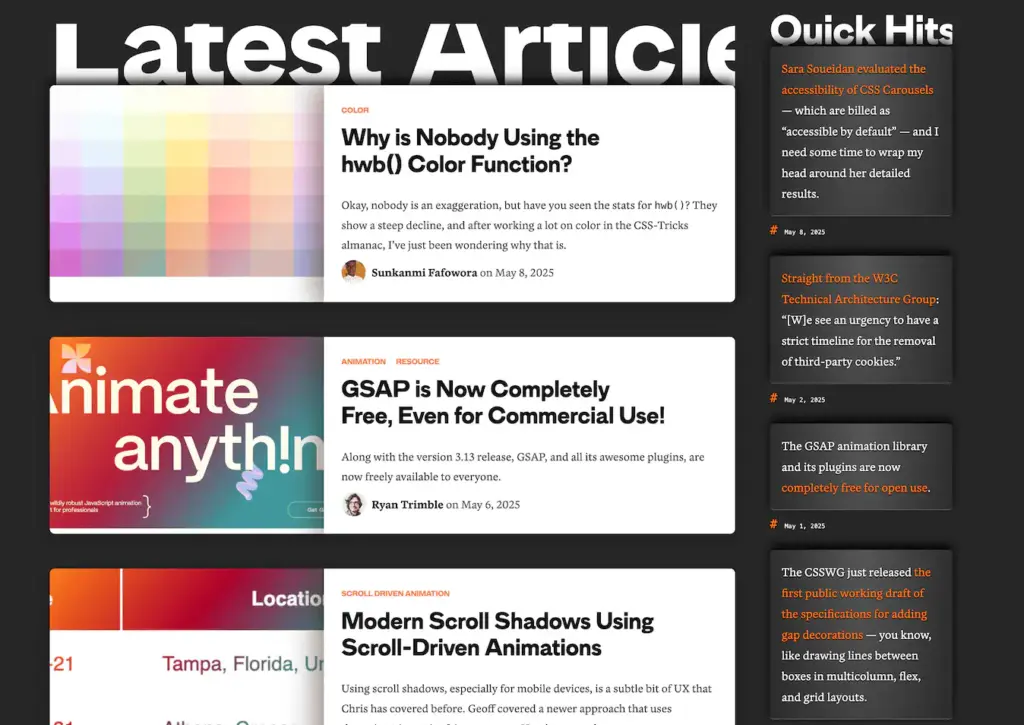
Not purely WordPress—but too iconic to ignore.
CSS-Tricks, started by Chris Coyier, has shaped how generations of front-end developers approach design. I’ve personally learned more about layout, spacing, and browser quirks here than from any course I’ve paid for.
If you’re working with Gutenberg, themes, or custom plugins, you’re still writing HTML, CSS, and JavaScript. And CSS-Tricks helps you do that better—way better.
From Flexbox to Grid, variables to container queries, it covers modern CSS with clarity and depth. Bookmark this, revisit often, and don’t underestimate its impact—especially when building truly polished WordPress frontends.
WPExplorer Blog

The WPExplorer Blog has been around forever and is one of the more popular WordPress blogs out there. It’s like one of those WordPress OGs that quietly keeps showing up with helpful content. They publish a mix of theme roundups, plugin guides, how-to tutorials, and WordPress tips that cover both beginner and intermediate levels.
Is it groundbreaking? No. But it’s consistent—and that counts. If you’re researching tools for a client project or need a second opinion on a plugin before installing it, WPExplorer is one of the blogs I still check.
Their theme lists are especially good. Not overloaded with fluff, and they usually highlight quality options rather than cramming in 100 random links for SEO.
It’s not my daily read, but it’s definitely saved me a few hours over the years. Worth bookmarking if you want a no-nonsense WordPress resource that covers the practical stuff without the hype.
Elegant Themes Blog
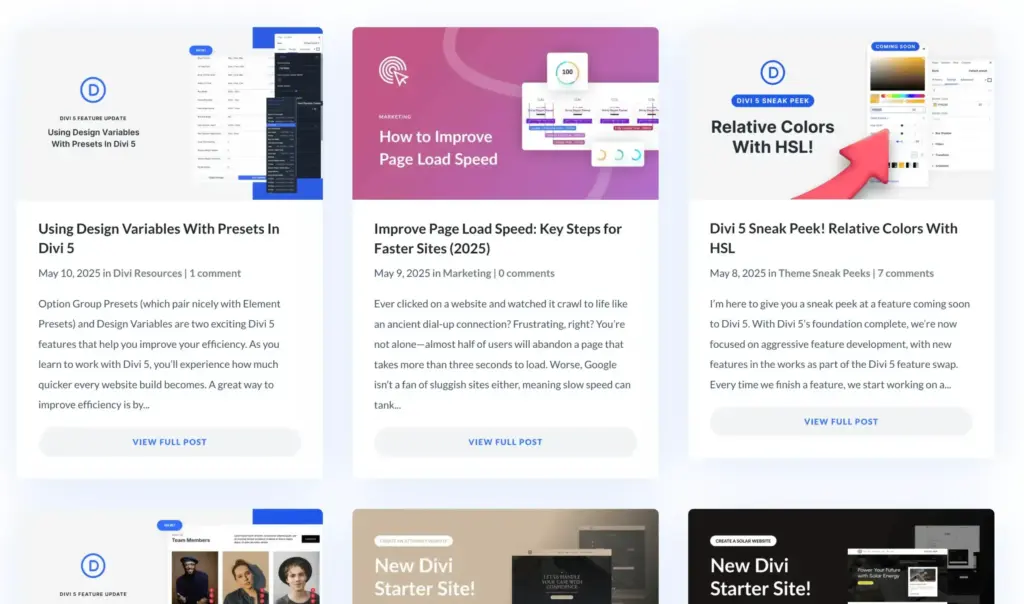
Whether or not you use Divi, you should be following this.
The Elegant Themes Blog is one of the most active WordPress blogs around. Yes, it leans heavily into Divi and its ecosystem, but it’s also packed with practical tutorials, email marketing tips, plugin highlights, and even design inspiration posts that apply broadly.
What I like most? The beginner-first tone without sounding condescending. You can send this to a client or a new team member, and they’ll get it without asking a bunch of questions.
Design-focused, always current, and easy to scan—this one’s worth adding to your weekly reading routine.
Make WordPress Core
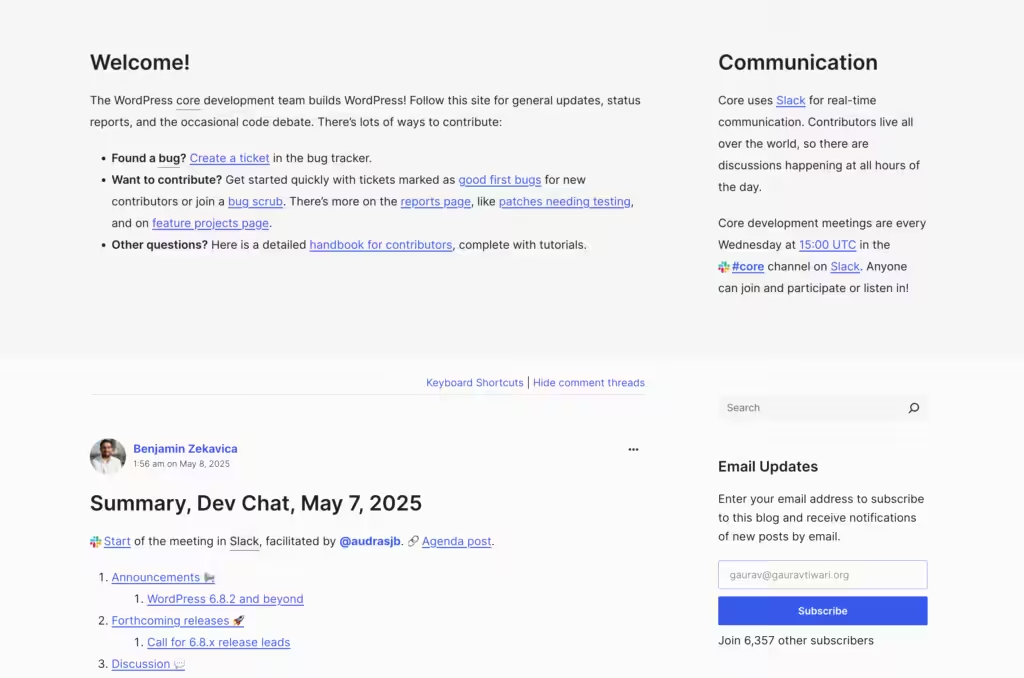
This is where the magic happens—quietly, methodically, and in public.
Make WordPress Core is where the people who build WordPress talk about what’s coming. Feature proposals, tickets, dev logs, roadmap updates—it’s all here.
It’s not beginner-friendly. And it’s not supposed to be. But if you care about WordPress’s future—or if you build plugins, themes, or anything serious on top of WP—this is where you get the signal before the noise.
I recommend checking in weekly via RSS or email. Don’t try to read it all. Skim for updates that affect your stack. And maybe—just maybe—get involved.
Matt Mullenweg

This one’s different.
Matt’s blog isn’t about code. It’s about philosophy, open-source, freedom, and the evolution of the internet. He’s not trying to teach you WordPress—he’s trying to make you think bigger about the world it lives in.
Some posts are short. Others are rambling. Some are deeply personal. But all of them give you a glimpse into the mind of someone who helped build the web you’re working on today.
For devs like us who sometimes forget the why behind the tools, Matt’s writing is a helpful reminder.
WP Mayor
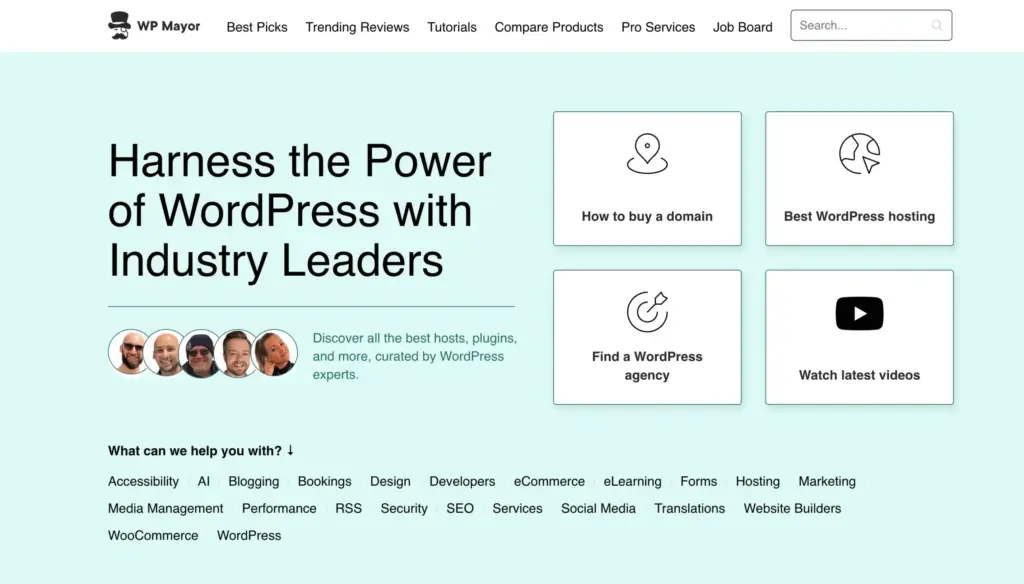
One of the oldest WordPress blogs still going strong—and for good reason.
WP Mayor feels like the grown-up version of a WordPress review site. They don’t chase clickbait. They do plugin comparisons, product deep dives, and real use case evaluations—and they do it well.
I’ve discovered tools here months before they started trending elsewhere. Their tone is professional without being dry, and their verdicts often match my real-world experience.
You won’t see daily updates, but when something drops, it’s usually gold.
WP Solver
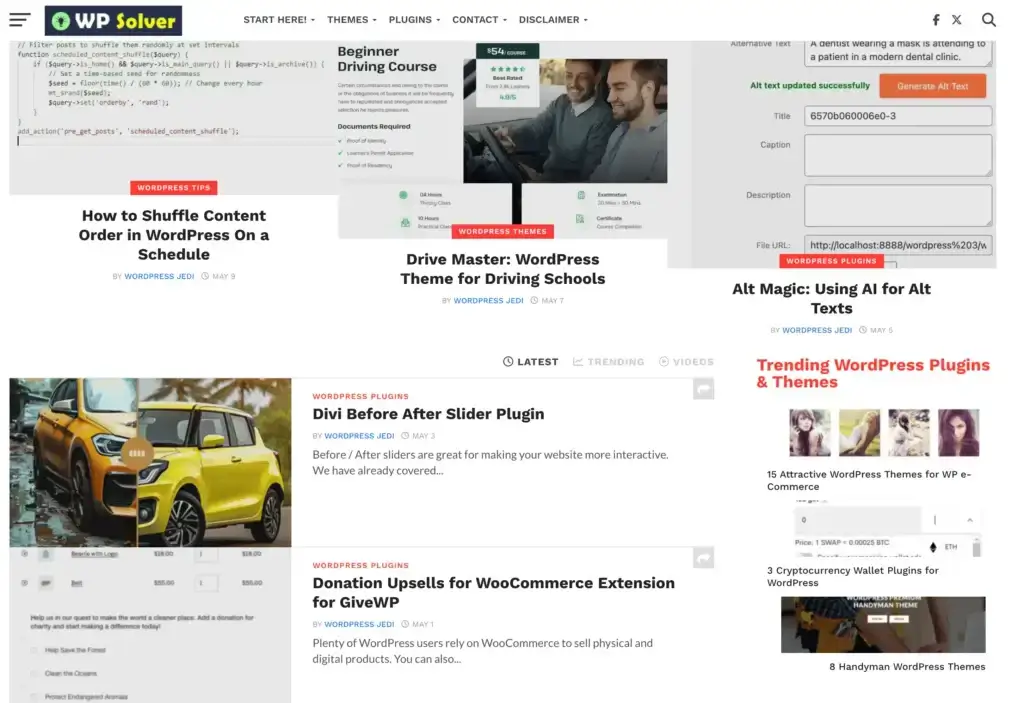
If WP Mayor is the analyst, WP Solver is the gearhead.
This blog is essentially a massive catalog of plugin and theme collections. Think “15 Best Security Plugins” or “Top Portfolio Themes for Designers”—and multiply that by hundreds.
It’s not for philosophical musings or development theory. It’s for finding the right tool fast. Especially useful if you build for clients or manage multiple WordPress sites and need quick, no-nonsense recommendations.
I often land here from Google, and I usually stick around.
WPBeginner

WPBeginner is where I send clients, interns, and junior devs when I don’t want to explain the same thing 50 times. Their tutorials are clear, screenshot-heavy, SEO-optimized, and usually kept up to date.
But there’s more: their tutorials on caching, backups, speed, and performance go deeper than you’d expect. And let’s not forget their product ecosystem (like SeedProd, OptinMonster, and WPForms)—which gives their guides a unique inside perspective.
In short: don’t let the name fool you. It’s a powerhouse.
WPMU DEV Blog
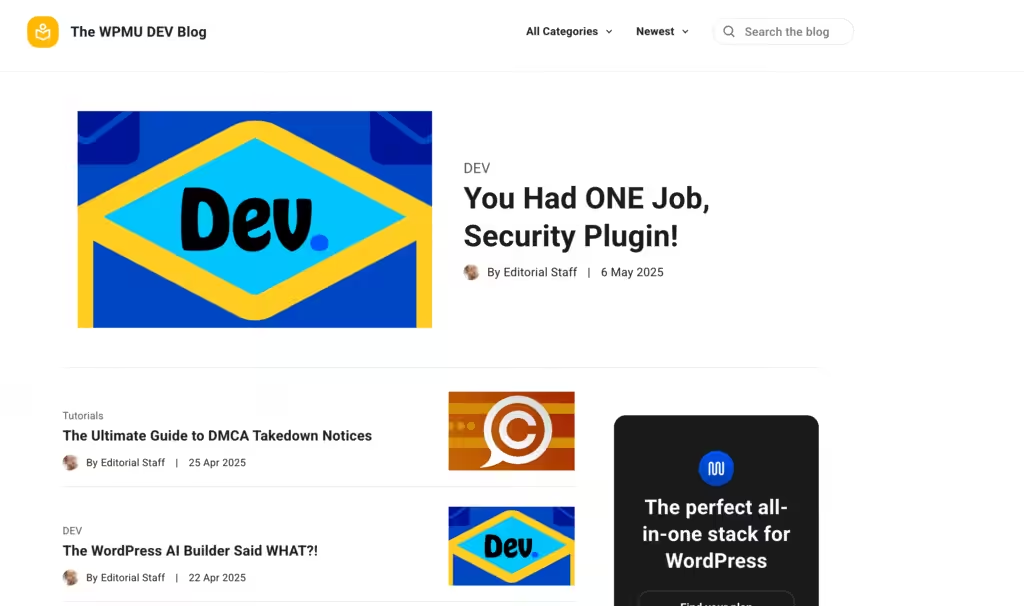
Now this is where it gets technical—and I love it.
The WPMU DEV Blog regularly publishes advanced content on WordPress optimization, multisite, CDNs, caching, hosting, and DevOps-y stuff that most blogs steer clear of.
They also back up their articles with real benchmarks, practical use cases, and clean code snippets. Not just theory. This is hands-on guidance from people who run large-scale WordPress networks.
If you’re managing client sites at scale—or trying to build a lean, fast WP stack—this is a must-follow.
WPShout

WPShout, now run by the Themeisle Team, is fantastic for WordPress developers who are still finding their footing. It doesn’t assume you’re some Laravel ninja. It assumes you’re working with WordPress every day and want to write better code, understand WP_Query, hooks, filters, and maybe learn the REST API without having to decode the Codex.
I recommend this to anyone who’s “beyond beginner” but not quite full-stack. Their explainers are better than most documentation—and the tone is always supportive, never smug.
Yoast Blog
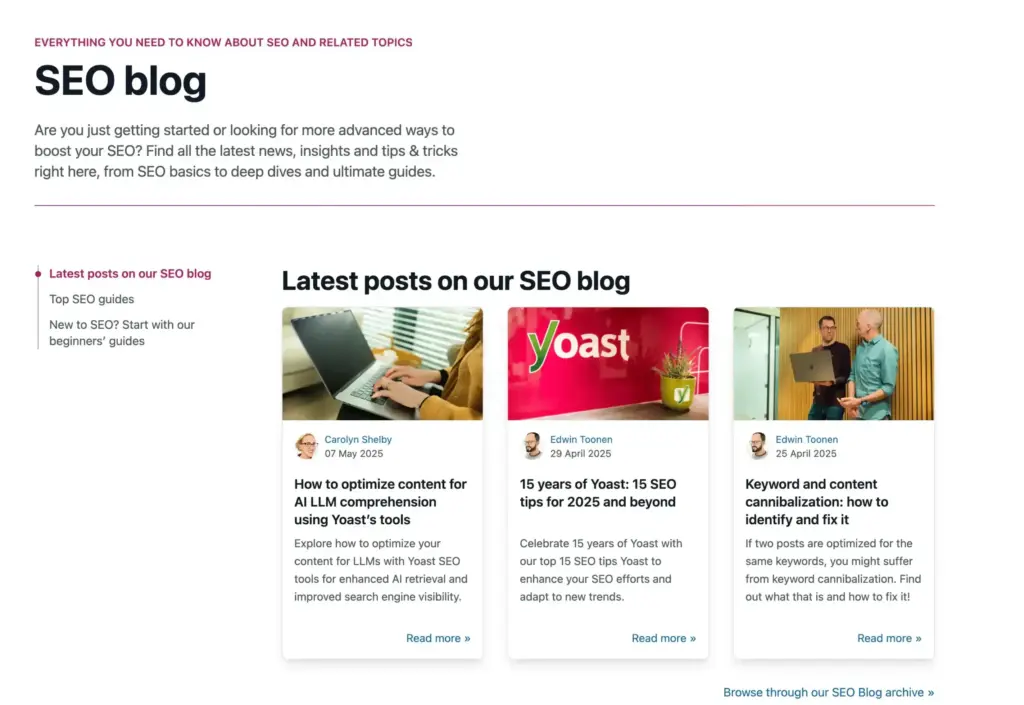
You can’t talk about WordPress SEO without talking about Yoast.
Even if you use Rank Math, AIOSEO, or SEOPress (all great tools, by the way), the Yoast Blog is still worth following. Why? Because they cover search algorithm updates, content readability, schema best practices, and accessibility in a way that’s deeply tied to how WordPress works.
Their changelogs are transparent. Their strategy posts are data-backed. And they regularly publish insights that affect how you rank—whether or not you use their plugin.
In other words: required reading for anyone serious about WordPress and SEO.
My Criteria for Following a WordPress Blog
There are thousands of WordPress blogs out there. Most of them? Just noise.
So when I say I follow a blog, I mean I actually read it, save its content, and refer back to it when solving real problems. That only happens when a blog checks certain boxes for me:
Regular Updates (Without Going Overboard): I don’t need daily posts. I just need consistency. If a blog hasn’t posted anything in the last 6 months, I’m not sticking around.
Depth Over Hype: The best WordPress blogs go beyond headlines. They break things down, show code examples, or explain the reasoning behind a tip.
I avoid blogs that just regurgitate changelogs or listicle fluff.
Practical Takeaways
A blog post should either teach me something new or save me time. If it doesn’t do either, what’s the point?
Balanced Opinions
I appreciate honest reviews—whether it’s for a plugin, theme, or hosting platform. I’m okay with affiliate links (I use them too), but only when the recommendation is real.
Clean Writing
No keyword-stuffed nonsense. No walls of text. Just clean, human writing that respects my time.
That’s the bar I use. If a blog hits even three out of five of those consistently, it earns a place in my bookmarks.
Other WordPress Blogs Worth Exploring
Not every blog earns a spot in my daily workflow—but there’s a second tier to top WordPress blogs I still keep tabs on. These are the blogs I dip into when I’m deep in research mode, testing out new tools, or just vibing through a late-night rabbit hole of WordPress content.
They’re not always consistent. They don’t always blow my mind. But every now and then? They deliver exactly what I need.
So here’s a shortlist that’s absolutely worth exploring:
WP Tavern
This was the newsroom of the WordPress world. But lately? It’s lost a bit of its spark.
WP Tavern used to be the first place I checked when something major happened—acquisitions, heated debates on WP Slack, upcoming changes to core. The reporting was sharp, timely, and often the only source putting things into real perspective.
But with many of the key writers moving on, the updates have slowed. The tone’s shifted. And that “in the trenches” feel? It’s not quite there anymore.
That said, I still swing by occasionally. It’s part of WordPress history, and when they do publish, it’s usually worth a read. Just don’t expect the frequency or depth it once had.
Kind of like TechCrunch for WordPress… if TechCrunch stopped publishing regularly.
Kinsta Blog
Honestly? One of the most technically refined blogs in the hosting space.
The Kinsta Blog nails it when it comes to performance benchmarks, DevOps tutorials, security best practices, and serious speed optimization. Sure, some articles feel like subtle promo pieces, but the core content? Rock solid.
They’ve published real-world plugin comparisons, guides on Nginx config tweaks, and in-depth caching strategies that are genuinely helpful. If you like clean writing, elegant visuals, and detailed code examples, this one’s for you.
Torque Magazine
A bit of a wildcard—but when Torque hits, it hits hard.
Backed by WP Engine, Torque leans more toward opinion pieces, community highlights, and big-picture WordPress topics. You’ll find plugin reviews, expert interviews, even occasional editorial rants (in a good way). It’s not always frequent, but it adds flavor to your feed.
Good for those days when you want to zoom out and think about where the ecosystem is headed.
ThemeIsle Blog
Clean. Digestible. Beginner-friendly.
The ThemeIsle Blog is great for users who are just starting out—or for devs like me who sometimes need a refresher explained in plain English. They publish solid content around Gutenberg blocks, plugin tips, and small business site design.
Their writing is friendly and professional, and their SEO game is tight. I often recommend their tutorials to clients who want to get hands-on with WordPress.
Learn WordPress (Official)
One of the official blogs by WordPress team, this one is not a blog in the classic sense, but it’s a goldmine if you’re serious about learning (or teaching) WordPress.
Learn WordPress is an official initiative by the WP.org community. It features tutorials, video workshops, and lesson plans contributed by folks from around the world. Great for educators, community leaders, or anyone building from the ground up.
I don’t visit often, but when I do, I usually discover something fresh or unexpected.
Final Thoughts
WordPress is constantly evolving. New tools come out every week, best practices change, and what worked last year might be outdated today.
That’s why following the right blogs matters.
The ones I’ve listed here? They’ve helped me become a better developer, writer, and business owner. They’ve saved me hours of trial and error. They’ve introduced me to tools I now can’t imagine working without.
And most importantly, they’ve taught me how to think in WordPress terms. Not just code and content, but strategy, scale, and sustainability. Now, I, too, have a WordPress blog that you can read and follow along with.
Whether you’re just starting out or knee-deep in multisite dev and client work, there’s value in building your own “reading stack.” You don’t need to follow everyone, but following a few great ones makes all the difference.
Disclaimer: This site is reader‑supported. If you buy through some links, I may earn a small commission at no extra cost to you. I only recommend tools I trust and would use myself. Your support helps keep gauravtiwari.org free and focused on real-world advice. Thanks. — Gaurav Tiwari